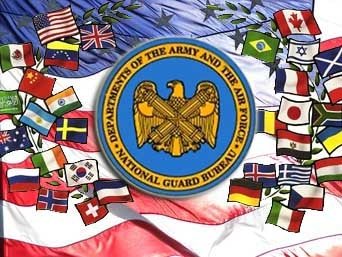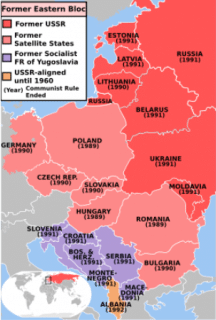by Ed Mattson
The National Guard Bureau of International Affairs-State Partnership Program (SPP) is an important arm of US international aid, little known but huge in its contribution to the global image of American.
With the collapse of the Soviet Union, the western nations were deeply concerned about what would happen to the “Iron Curtain-Eastern Bloc nations” once they declared their freedom and independence. Following WWII, Russia annexed as much real estate as it could muscle retaining power over many of the countries which were already heavily influenced by Russian economic support and culture, including Estonia, Latvia, Lithuania, Byelorussia, Ukraine, Moldova, Armenia, Azerbaijan, Georgia, Kazakhstan, Turkmenistan, Uzbekistan, Kirgizia, Tajikistan (later to become the C.I.S.-Commonwealth of Independent States). They also grabbed countries which Germany had defeated early-on in the war. Falling under this “Eastern-Bloc” were the countries of Poland, Czechoslovakia, Bulgaria, Romania, Hungary, Albania, Yugoslavia, and Eastern Germany.
Throughout the Eighties, unrest and turmoil within many countries of the Soviet Union, from Czechoslovakia to Poland, began to cause fissures behind the Iron Curtain, lead in part by the independent nature of Yugoslavia under the leadership of Josip Broz Tito. Tito, who is of mixed Croatian and Slovenian descent, emerged from World War II in a unique position. While the Soviet Red Army had been responsible for driving the Germans out of much of eastern and central Europe, Tito and his Partisans drove out the Germans almost single handedly. Tito and Stalin agreed that the Red Army would not enter Yugoslavia. This is significant because Soviet leader Joseph Stalin had virtually no influence in Yugoslavia since his Red Army was not there and because Tito had made a name for himself independent of Stalin, whereas all the other communist leaders were beholden to Stalin for “rescuing them” from Nazism.
Tito’s independence and the eventual abandonment of agricultural collectivization, workers councils, and the centralization of economic and administrative controls created economic growth that was the envy of neighboring countries. Furthermore, Yugoslavs possessed more freedoms and liberties than most others living in communist regimes and were allowed to work or travel freely in the west, and had standards of living that were considerably higher than most other socialist states, making “independence” very attractive to those under the Soviet repressive fist.

When President Ronald Reagan proclaimed in his now famous 1987 Berlin speech, “Mr. Gorbachev, tear down this wall”, referring to the walled-off, isolated city of Berlin during the Cold-War, the American press, most politicians and the National Security Council (NSC) staff along with the State Department were fearful of antagonizing the Soviet government. The argument ensued for many weeks to get Reagan’s now famous line removed from the speech, but it turned out to be the straw that broke the back of the Soviet grip on the Iron Curtain countries, and lead to the dismantling of the USSR. To those of us alive at that time, many held their breath to see what the reaction from the Soviets would be, but to those behind the Iron Curtain, the movement toward freedom could not be stopped.
The State Department was not prepared for the domino-effect that speech would have, and it was feared that all the formerly Soviet dominated countries would fall into chaos, and possibly even ethnic wars, after all it was only the strong communist rule and the threat of the Soviet military that kept Muslims from Christians, Turks from Armenians, and other possible clashes and ethnic “pay-backs” dating back for centuries. And as we witnessed in 1992, the ethnic wars in Bosnia, Croatia, and Herzegovina, the long-standing tensions between Azerbaijan, Turkey, and Armenia, and the cessation/genocide of Chechnya in 1994, such fears were well founded
To allow for a peaceful transition to democracy of the newly create Newly Independent States (NIS), the US Departments of Defense and State, in collaboration with the NATO alliance recognized a need to stabilize the NIS and contemplated military involvement in these countries, but active US military involvement so close to Russia could be perceived as hostile by the Russians. So the US decided to utilize the various State National Guards to serve as consultants to the leadership of the NIS countries to stabilize institutions within their governments should they be asked to do so. It was determined that the National Guard was the only entity capable of bringing together all the civilian and military sectors necessary to achieve success in the State Partnership Program.
The goal of the program was carefully designed to build positive, long-term relationships with the United States to support democratic endeavors, human rights, and create an environment for open economic markets and trade. Why use the National Guard for such a task was asked by many inside the Beltway who had heard of the program being developed. The difficulty of transitioning from a communist, centrally controlled economy to a democratic, free-enterprise, entrepreneurial economy was thought to be a near-impossible situation given the history of the countries making up the NIS, with all their ethnic clashes, jealousies, and hatred. Peace in those countries where every move was centrally controlled, planned, and enforced through military power was the only answer.
Actually the State Partnership Program was brilliant by design. Who better to help countries rise out of the dust of communism that the citizen-soldiers of the US National Guards. The entire program was based on creating “state to country” relationships whereby the guardsmen would be the facilitators working at the behest of the US Ambassadors, in many cases utilizing USAID funding, to help build democratic institutions through leadership that would include:
- Jurisprudence – the rule of law
- Free elections
- Educational exchanges between partner states and countries
- Medical/dental exchanges and technology
- Student work/study exchanges to help establish cultural understanding
- Work/study exchanges to help countries implement modern free-market business understanding
- Support areas of need determined by the citizens to insure their move toward democracy would prove successful
The key to why the program has been successful is that no relationship between states and countries has been “forced”. Each relationship is by invitation and generally the countries share much in common with their partner states, from agricultural production to culture. A great example is that of Pennsylvania and Lithuania where there are close to 500,000 ex-patriots living today. Both countries have strong agricultural bases in similar crops, both have sea ports and face similar concerns over environmental issues. Ambassador Anne Derse, with the help of the local agencies in Vilnius, Lithuania, has laid out an aggressive program to develop modern homes for orphans, upgrade facilities for the aged and hospice-needing citizenry, and programs to encourage educational exchanges to improve the job opportunities (unemployment is currently about 20%).
|
I have worked as a volunteer Project Development Director for the SPP coordinating efforts for many projects, assisting in fundraising, and outsourcing goods and services, working within the service organization communities (Rotary, Lions, and Kiwanis), the faith-based communities, and other non-governmental organizations. Together we have participated in many humanitarian projects (building schools, medical facilities, and infrastructure), disaster relief (Haiti, Philippines, and the Caribbean countries), and delivered tons of much needed goods (ambulances, fire trucks, medical supplies and equipment, food aid, and even a semi-truck and trailer to transport good in-country).
The NGBIA-SPP program is America at its finest, and I am proud to play a part in helping spread the goodwill of our country and working side-by-side with the great National Guardsmen that make the program possible.

Following his service in the Marine Corps Ed Mattson built a diverse career in business in both sales/marketing and management. He is a medical research specialist and published author. His latest book is Down on Main Street: Searching for American Exceptionalism
Ed is currently Development Director of the National Guard Bureau of International Affairs-State Partnership Program, Fundraising Coordinator for the Warrior2Citizen Project, and Managing Partner of Center-Point Consultants in North Carolina.
Mr. Mattson is a noted speaker and has addressed more than 3000 audiences in 42 states and 5 foreign countries. He has been awarded the Order of the Sword by American Cancer Society, is a Rotarian Paul Harris Fellow and appeared on more than 15 radio and television talk-shows.
ATTENTION READERS
We See The World From All Sides and Want YOU To Be Fully InformedIn fact, intentional disinformation is a disgraceful scourge in media today. So to assuage any possible errant incorrect information posted herein, we strongly encourage you to seek corroboration from other non-VT sources before forming an educated opinion.
About VT - Policies & Disclosures - Comment Policy



